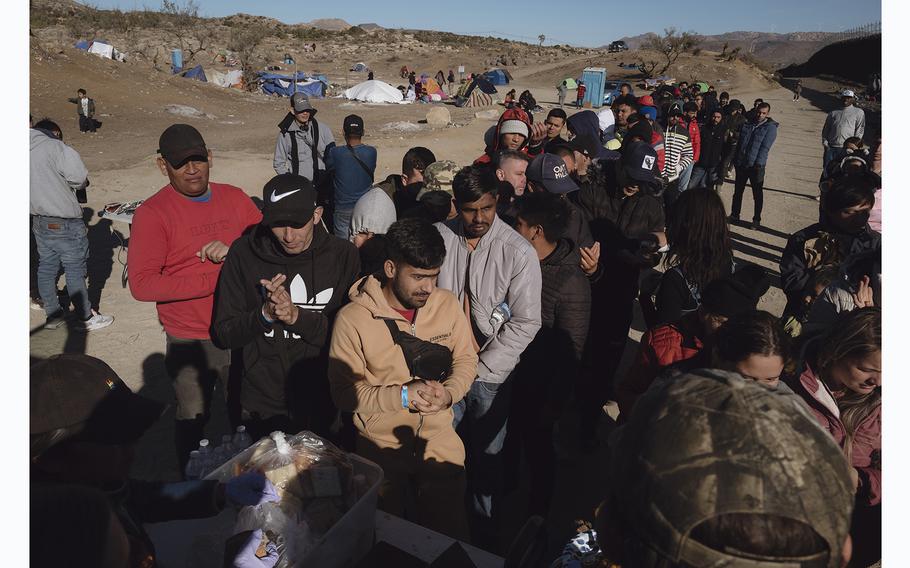
Local volunteers distribute food to migrants in Jacumba Hot Springs, Calif., on Dec. 14, 2023. (Zaydee Sanchez for The Washington Post)
President Joe Biden said he will send top U.S. officials to Mexico in the coming days to seek help with the record migration surge that has pushed the number of illegal border crossings to more than 10,000 per day, prompting U.S. authorities to shut down two major railway crossings and other ports of entry.
“More enforcement actions are urgently needed to reopen key ports of entry across our shared border,” Biden wrote Thursday evening on X (formerly Twitter), after speaking by phone earlier in the day with Mexican President Andrés Manuel López Obrador.
Secretary of State Antony Blinken, Secretary of Homeland Security Alejandro Mayorkas and White House homeland security adviser Liz Sherwood-Randall will travel to Mexico “in the coming days” to meet with the Mexican leader and urge a firmer response, the White House said.
Thousands of migrants from countries around the world have been streaming across the border this month, the second consecutive December that U.S. agents have faced a massive influx during the holiday season.
Mexico’s immigration enforcement agency, the Instituto Nacional de Migración, has slackened its operations in recent weeks as its annual funding runs low, according to U.S. and Mexican officials.
In Lukeville, Ariz., families with children and groups from Africa, Asia and South America have been entering through breaches in the U.S. border wall where smugglers have sawed through.
In Eagle Pass, Tex., Border Patrol agents have had to set up a sprawling outdoor reception area to manage the thousands of migrants arriving daily by wading across the Rio Grande. Agents are facing spikes in Jacumba Hot Springs, Calif., as well as El Paso and other remote sections of southern Arizona.
Mexican forces are rarely visible on the south side of the border. The country’s National Guard has played a key role during previous migration crackdowns, but there has been scant presence of troops in recent weeks at the busiest crossing points.
Many migrants have arrived to the United States by riding freight trains through Mexico. The Biden administration’s decision to close the rail crossings at El Paso and Eagle Pass, Tex. - an attempt to stem the tide of migrants - is a significant disruption of commerce between the United States and its top trading partner.
U.S. farm groups, the rail companies and the U.S. Chamber of Commerce are urging the Biden administration to reopen the crossings as soon as possible. Train operator Union Pacific said that the two crossings account for 45 percent of all cross-border rail commerce and that the shutdowns are inflicting losses of $200 million per day in wages, goods and transportation costs.
The Biden administration has not said publicly what specific actions it wants Mexico to take. Mexican authorities have long been wary of offers by the United States to help pay for immigration enforcement actions on Mexican soil.
“Everything revolves around getting the Mexican government to do targeted operations,” said one U.S. official, who, like others, spoke on the condition of anonymity because they were not authorized to speak to reporters.
The United States would like to expand deportation flights to southern Mexico that would carry migrants from that region as well as Central Americans, two officials said.
Mexico’s cooperation with U.S. immigration enforcement has fluctuated in recent years, and both the Biden and Trump administrations have turned to Mexico for help when illegal crossings soar. Mexican law offers broad protections to migrants transiting the country, which makes crackdowns more difficult. The country’s enforcement efforts are weakened further by corruption and bribe-taking.
Mexican authorities say they remain committed to working with the United States to manage migration, while urging the U.S. government to expand work visas and alleviate the conditions driving people to leave their home countries.
Biden officials are urging Congress to approve a $106 billion White House supplemental funding request that would send aid to Ukraine and Israel while providing nearly $14 billion for border operations and immigration measures. Republicans are demanding new restrictions to asylum access, expanded deportation powers and other enforcement tools, some of which face stiff opposition from Democrats and the president.
Negotiators in the Senate said they have made progress toward a deal. But most lawmakers have left Washington for the holiday break, leaving any deal unlikely to be reached before the end of the year.